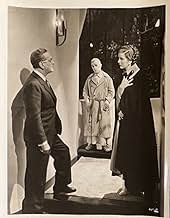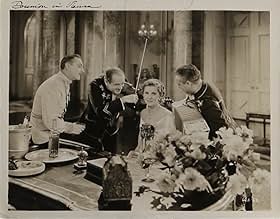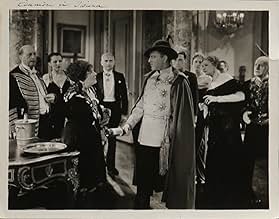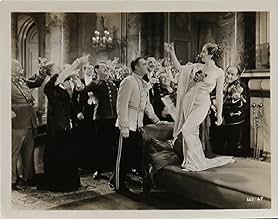AVALIAÇÃO DA IMDb
6,0/10
379
SUA AVALIAÇÃO
Adicionar um enredo no seu idiomaAn archduke who had been banished from Austria returns to Vienna for a reunion of his old fellow aristocrats and meets up with the former love of his life, who is now married to a psychoanal... Ler tudoAn archduke who had been banished from Austria returns to Vienna for a reunion of his old fellow aristocrats and meets up with the former love of his life, who is now married to a psychoanalyst.An archduke who had been banished from Austria returns to Vienna for a reunion of his old fellow aristocrats and meets up with the former love of his life, who is now married to a psychoanalyst.
- Direção
- Roteiristas
- Artistas
- Indicado a 1 Oscar
- 3 vitórias e 1 indicação no total
Morris Ankrum
- Musician
- (não creditado)
Symona Boniface
- Noblewoman
- (não creditado)
John Davidson
- Police Officer
- (não creditado)
George Davis
- Waiter
- (não creditado)
Ferdinand Gottschalk
- Palace Tour Guide
- (não creditado)
Tenen Holtz
- Tourist with Drapes
- (não creditado)
- Direção
- Roteiristas
- Elenco e equipe completos
- Produção, bilheteria e muito mais no IMDbPro
Avaliações em destaque
John Barrymore is perfectly cast as the fallen Habsburg prince, Rudolf, reduced to making a living as a taxicab driver by the fortunes of war and the fall of the empire. Barrymore brings to this role the perfect mix of tragedy, bathos, and comic self-deprecation. Diana Wynyard is entirely believable as his erstwhile lover dissatisfied with the clinical attentions of her psychiatrist husband, Frank Morgan, and longing for the lost days at Schoenbrun. Eduardo Cianelli, Henry Travers, Una Merkle, and May Robson round out the ensemble cast in this highly enjoyable period piece. Sadly, as Diana Wynyard's character finds, we all have to live in the present.
John Barrymore as a Habsburg Archduke reduced to driving a hack, fifteen years after "the Revolution," towers over this rarely shown movie that had a welcome screening at the Museum of Modern Art in New York today. Other pleasures included seeing familiar actors playing against type: Eduardo Ciannelli as the sweet and loyal former valet of the Archduke, Henry Travers as Frank Morgan's dotty but perspicacious father, May Robson as a crude, cigar-chomping hotelier with a heart of gold and red drawers. The premise that the love of one's life can return and the affair will resume even decades later is examined wittily and touchingly in this cinematic version of Robert E. Sherwood's play. The former lovers, Barrymore and Diana Wynyard, are funny, sexy and heartbreaking. Frank Morgan, as the husband, is fine in a thankless role. And the music which contributes to the emotionality of the work is terrific. This little-known film deserves to be released on DVD.
I do NOT care for John Barrymore. He is always a cocky cad (usually drunk) and he thinks he is a great lover. I don't know how the leading actresses fall for such a character.
But Diana Wynyard and Frank Morgan are both great in this film. I loved Wynyard when she was in "Men Must Fight" earlier this year (1933). She plays difficult roles naturally and convincingly. I understand this is a role she created in the stage version also before it became a film.
Frank Morgan is great as her husband who supports his wife and believes in her even when he knows she might be heading in to trouble.
The film is long but the theme is very clear: You can remember the past and have fond memories of another life, but you can't live in the past. You can ONLY live in the present and live for the future.
Wynyard served on the royal court and was Barrymore's favorite courtesan. The Austrian royal family was banished and Barrymore lost his spoiled and privileged position. While Wynyard misses those days, she has moved on and is happy with Morgan. Barrymore has not moved on and still thinks he is the same spoiled careless royal he was. He assumes this means he can take up with Wynyard anytime he wants.
You can see the longing and sadness in Wynyard's character as she is torn between the present and the past. The past was wonderful, but it is over. Or is it?
Strong characters. Intriguing situations. And a study in how time moves on. It really has no choice.
So check out this classic and remember not to live in the past. Look at it but don't live in it. Keep the present classy!
But Diana Wynyard and Frank Morgan are both great in this film. I loved Wynyard when she was in "Men Must Fight" earlier this year (1933). She plays difficult roles naturally and convincingly. I understand this is a role she created in the stage version also before it became a film.
Frank Morgan is great as her husband who supports his wife and believes in her even when he knows she might be heading in to trouble.
The film is long but the theme is very clear: You can remember the past and have fond memories of another life, but you can't live in the past. You can ONLY live in the present and live for the future.
Wynyard served on the royal court and was Barrymore's favorite courtesan. The Austrian royal family was banished and Barrymore lost his spoiled and privileged position. While Wynyard misses those days, she has moved on and is happy with Morgan. Barrymore has not moved on and still thinks he is the same spoiled careless royal he was. He assumes this means he can take up with Wynyard anytime he wants.
You can see the longing and sadness in Wynyard's character as she is torn between the present and the past. The past was wonderful, but it is over. Or is it?
Strong characters. Intriguing situations. And a study in how time moves on. It really has no choice.
So check out this classic and remember not to live in the past. Look at it but don't live in it. Keep the present classy!
Diana Wynard is married to Frank Morgan, a psychiatrist who is clearly a stand-in for Freud. Twenty years earlier, she was the mistress of Prince John Barrymore. Now, like all the Habsburgs, he is forbidden to enter the country. Even so, he stalks through their marriage, a ghost at an uneasy feast. This doesn't stop him from showing up at Princess May Robson's hotel, and commanding Miss Wynard's presence.
Based on Robert Sherwood's play that originally starred Lunt and Fontanne, Barrymore offers himself as a gigantic, self-mocking sociopath, playing the role as he would later play Oscar Jaffee in 20TH CENTURY, magnificently mad, and ultimately aware of it. He overwhelms everyone in his brashness, his assumptions of rights and privileges; Miss Robson may dominate scenes, and Henry Travers, in his first movie appearance, as Morgan's father, likewise, but it is all they can do to hold their own when Barrymore swaggers onto the scene. It's a lot of fun to watch Barrymore. Perhaps that's why the ending is so flat. Morgan makes a rare decision to underplay his role, and this makes Miss Wynard seem less sure of why she makes the decision to stay with him. Has she grown up and come to care for a man who has made his own accomplishments, or is she simply making the safe choice? I'm sure that couples taking the midnight train back to Scarsdale wondered the same thing, with the wife assuring her husband that, yes, it is love.
Based on Robert Sherwood's play that originally starred Lunt and Fontanne, Barrymore offers himself as a gigantic, self-mocking sociopath, playing the role as he would later play Oscar Jaffee in 20TH CENTURY, magnificently mad, and ultimately aware of it. He overwhelms everyone in his brashness, his assumptions of rights and privileges; Miss Robson may dominate scenes, and Henry Travers, in his first movie appearance, as Morgan's father, likewise, but it is all they can do to hold their own when Barrymore swaggers onto the scene. It's a lot of fun to watch Barrymore. Perhaps that's why the ending is so flat. Morgan makes a rare decision to underplay his role, and this makes Miss Wynard seem less sure of why she makes the decision to stay with him. Has she grown up and come to care for a man who has made his own accomplishments, or is she simply making the safe choice? I'm sure that couples taking the midnight train back to Scarsdale wondered the same thing, with the wife assuring her husband that, yes, it is love.
I finally managed to acquire a copy of this almost forgotten film, chiefly because of my interest in John Barrymore. The film has never been shown on TV in Europe and is unavailable on video or DVD, so it was a delightful surprise to discover how very good it is.
1933 was perhaps John Barrymore's best year in films, just before the slide into alcoholism reduced him to infrequent supporting roles. As well as Reunion in Vienna, he made Topaze (another delightful film) Counsellor at Law (perhaps his greatest screen performance) and Dinner at 8 (a close second).
If you want proof of Barrymore's sheer star quality and presence, take a look at Reunion in Vienna. He dominates the screen in every scene he is in, and when he is on screen, it is difficult to look at anyone else. His wonderfully mellifluous voice is particularly well recorded in this film and his performance is so full of delightful details, and many ad lib physical touches, that one can see how superb he must have been on stage.
Equally surprising here is the subtle performance by Frank Morgan before his familiar bumbling, stammering persona took over almost every performance he gave at MGM. He was a much better actor than remembered today.
The supporting cast is a delight, although not populated by the many émigrés that would shortly arrive from Nazi Europe and become a regular part of Hollywood's scene. Compare this film with THE GREAT WALTZ (1938) to see what I mean.
As a result, the Hapsburg aristocrats are mostly played by Americans (the exception being Eduardo Cianelli who is genuinely touching, giving an excellent portrayal of a devoted servant to his old master).
The music score is credited to William Axt, even though it is really a pot-pourri of themes by Johann Strauss. The exception is a main theme which is a direct steal from Romberg's NEW MOON, then a fairly new work and filmed 2 years before by MGM with Grace Moore and Lawrence Tibbett. Possibly Dr Axt decided to borrow the waltz "One Kiss" and vary it slightly for this film.
As others point out here, the art direction is beautiful throughout and Ms Wynyard never looked more radiant.
In all, a delightful and superbly acted film that should be on DVD. Why isn't it? The print I have looks as if it has never left the vault in 80 years.
1933 was perhaps John Barrymore's best year in films, just before the slide into alcoholism reduced him to infrequent supporting roles. As well as Reunion in Vienna, he made Topaze (another delightful film) Counsellor at Law (perhaps his greatest screen performance) and Dinner at 8 (a close second).
If you want proof of Barrymore's sheer star quality and presence, take a look at Reunion in Vienna. He dominates the screen in every scene he is in, and when he is on screen, it is difficult to look at anyone else. His wonderfully mellifluous voice is particularly well recorded in this film and his performance is so full of delightful details, and many ad lib physical touches, that one can see how superb he must have been on stage.
Equally surprising here is the subtle performance by Frank Morgan before his familiar bumbling, stammering persona took over almost every performance he gave at MGM. He was a much better actor than remembered today.
The supporting cast is a delight, although not populated by the many émigrés that would shortly arrive from Nazi Europe and become a regular part of Hollywood's scene. Compare this film with THE GREAT WALTZ (1938) to see what I mean.
As a result, the Hapsburg aristocrats are mostly played by Americans (the exception being Eduardo Cianelli who is genuinely touching, giving an excellent portrayal of a devoted servant to his old master).
The music score is credited to William Axt, even though it is really a pot-pourri of themes by Johann Strauss. The exception is a main theme which is a direct steal from Romberg's NEW MOON, then a fairly new work and filmed 2 years before by MGM with Grace Moore and Lawrence Tibbett. Possibly Dr Axt decided to borrow the waltz "One Kiss" and vary it slightly for this film.
As others point out here, the art direction is beautiful throughout and Ms Wynyard never looked more radiant.
In all, a delightful and superbly acted film that should be on DVD. Why isn't it? The print I have looks as if it has never left the vault in 80 years.
Você sabia?
- CuriosidadesThis film was included in the original MGM feature film package first released to television in late 1956. It was first telecast in Los Angeles Thursday 25 April 1957 on KTTV (Channel 11); it first aired in Hartford CT 4 June 1957 on WHCT (Channel 18, in Miami 15 June 1957 on WCKT (Channel 7), in Minneapolis 29 June 1957 on KMGM (Channel 9), in Seattle 24 July 1957 on KING (Channel 5), in New York City 26 August 1957 on WCBS (Channel 2), in Portland OR 31 August 1957 on KGW (Channel 8), in Norfolk VA 24 November 1957 on WTAR (Channel 3), in Honolulu 3 December 1957 on KHVH (Channel 13), in Akron 31 December 1957 on WAKR (Channel 49), and in Peoria 9 January 1958 on WTVH (Channel 19). In Philadelphia it was Initially telecast 13 May 1958 on WFIL (Channel 6), and in San Francisco 13 March 1959 on KGO (Channel 7),; it was also shown during this period on most of the other many stations who had contracted for this MGM series. It was last telecast on cable TV on Showtime in August 1985. Since that time, legal complications involving rights problems arose, and it was withdrawn from public exhibition. Presently, it's in the TCM library, but has yet to be shown, or released on DVD, because of this situation.
- ConexõesReferenced in Hollywood Hist-o-Rama: John Barrymore (1962)
Principais escolhas
Faça login para avaliar e ver a lista de recomendações personalizadas
Detalhes
- Data de lançamento
- País de origem
- Idiomas
- Também conhecido como
- Reunion in Vienna
- Locações de filme
- Empresa de produção
- Consulte mais créditos da empresa na IMDbPro
- Tempo de duração
- 1 h 38 min(98 min)
- Cor
- Proporção
- 1.37 : 1
Contribua para esta página
Sugerir uma alteração ou adicionar conteúdo ausente






































